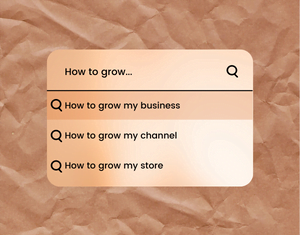
Disclaimer: This post may contain affiliate links, meaning we get a small commission if you purchase through our links. For more information, please visit our Disclaimer Page.
SEO for Beginners: A Comprehensive Guide to Getting Started

An essential cornerstone of digital marketing, Search Engine Optimization (SEO) is key to amplifying your virtual presence and driving a surge in organic website traffic. Mastering SEO’s fundamentals may initially appear daunting, yet it is indispensable for businesses striving to cement a robust online foothold.
Delve into this primer on SEO that elucidates the core tenets of website optimization for search engines. Grasp the essence of SEO, its significance, and the mechanisms underpinning its workings. Furthermore, we’ll share a trove of actionable recommendations to elevate your website’s SEO, encompassing keyword exploration, on-site enhancement, and link construction.
Newcomers to SEO or those seeking a knowledge refresher will find this guide invaluable. The insights and methodologies delineated in this exposition can bolster your website’s visibility, captivate more organic visitors, and propel your digital enterprise to new heights.
What is SEO?
Search Engine Optimization (SEO) is optimizing your website to increase its visibility and ranking in Search Engine Results Pages (SERPs). Search engines like Google, Bing, and Yahoo use complex algorithms to determine which websites are the most relevant and authoritative for a particular search query. Optimizing your website increases the likelihood of appearing at the top of the search results for relevant keywords and phrases.
SEO can be broken down into two main categories: on-page optimization and off-page optimization.
SEO is an ongoing process that requires consistent effort and attention. It is not a one-time fix but rather a long-term strategy for improving your website’s visibility and attracting more organic traffic. While SEO can be complex and time-consuming, it is essential to any successful digital marketing strategy.
Why is SEO Important?
SEO, or search engine optimization, is critical to any successful digital marketing strategy. It involves optimizing your website and content to rank higher in search engine results pages (SERPs) for relevant keywords and phrases. But why is SEO so important?
Undoubtedly, the foremost benefit of SEO lies in its capacity to bolster organic traffic to your website. As your website ascends the search engine rankings, the likelihood of individuals clicking through to your site skyrockets. Consequently, this phenomenon amplifies brand visibility, augments the influx of leads, and fuels sales growth.
In addition, SEO serves as a linchpin in cementing your brand’s position as an industry vanguard. You manifest your expertise and credibility by crafting sterling, germane content that excels in search engine standings. This strategy fosters trust among prospective clientele, culminating in an upsurge of brand allegiance.
After optimizing your site and content for search engines, you can enjoy the advantages for months or even years. To put it briefly, the significance of SEO lies in driving organic traffic to your website, positioning your brand as an expert, and providing an affordable marketing approach.
Investing in SEO can enhance your online presence, draw in a larger pool of prospective clients, and ultimately expand your business.
Keyword Research
Keyword analysis aids in comprehending the search queries of your target audience, enabling you to tailor your website content to fulfill their requirements.
The Google Keyword Planner is a widely recognized and free-to-use tool for keyword research. When performing this research, it is crucial to focus on relevant keywords connected to your business or website. Additionally, considering the search intent behind each keyword is essential to optimize your content effectively.
Keywords Categories
Keywords can generally be classified into three main categories based on search intent:
Informational Keywords: indicate that the user seeks information on a particular topic. Examples include “how to start a blog” or “benefits of yoga.” To target these keywords, create high-quality, informative content that answers the user’s questions and provides valuable insights.
Navigational Keywords: These keywords suggest the user is looking for a specific website or webpage. Examples include “YouTube” or “Amazon login.” While it may be challenging to rank for these keywords if you’re not the website being searched for, you can still benefit from using them in your content when it’s relevant.
Transactional Keywords imply that the user is ready to purchase or take action. Examples include “buy running shoes” or “best web hosting plans.” To target these keywords, create content that showcases your products or services and encourages users to purchase or take the desired action.
When conducting keyword research, keep these intent search categories in mind, and prioritize keywords with a higher likelihood of conversion. Additionally, consider other factors such as search volume, competition, and geographic location to refine your keyword strategy further. By targeting the right keywords with the appropriate search intent, you’ll increase your chances of attracting relevant traffic and converting visitors into customers.

Once you have identified relevant keywords, you can optimize your website content accordingly. This involves incorporating the keywords into your website pages, including the title tags, meta descriptions, and content. However, it’s important to avoid keyword stuffing, which is the practice of overusing keywords to manipulate search engine rankings. This can result in penalties from search engines and may harm your website’s visibility.
In summary, keyword research is a crucial aspect of SEO. It helps you to understand what your target audience is searching for and enables you to optimize your website content accordingly. Using the right tools and focusing on relevant keywords can improve your website’s visibility and attract more traffic.
On-Page Optimization
On-page optimization is the process of optimizing individual web pages in order to rank higher and earn more relevant traffic in search engines. It includes optimizing both the content and HTML source code of a page.
Several factors can affect on-page optimization, including:
- Keyword usage and placement
- Title tag optimization
- Meta description optimization
- Header tag optimization
- Image optimization
- Internal linking structure
One of the most important aspects of on-page optimization is keyword usage and placement. Use relevant keywords throughout your content, including title tag, meta description, header tags, and body copy. However, using keywords naturally and avoiding “keyword stuffing” is important, which can hurt your rankings.
The humble yet mighty title tag – is often overlooked but undeniably essential in the grand scheme of on-page SEO. Behold the guiding beacon for search engine crawlers, revealing the true essence of your webpage!
Ah, but the secret sauce lies in the delicate balance of keyword infusion and human-centric allure. To master this, one must artfully weave relevant keywords into a compelling tapestry that captivates the user’s attention while accurately reflecting the page’s content.
Lo and behold, on-page optimization is a cornerstone of any formidable SEO strategy. By carefully refining each page within your digital domain, watch your rankings soar, and a veritable deluge of relevant traffic floods your site.
Off-Page Optimization
Off-page optimization is an essential component of any effective SEO strategy. It refers to the actions taken outside your website to improve its ranking in search engine results pages (SERPs). While on-page optimization focuses on improving the content and structure of your website, off-page optimization is all about building your website’s reputation and authority.
The most important factor in off-page optimization is link building. This involves getting other high-quality websites to link back to your website. The more links you have from reputable websites, the higher your website will rank in search engine results. However, it’s important to note that not all links are created equal. Links from low-quality or spammy websites can hurt your website’s ranking.
Another important aspect of off-page optimization is social media marketing. Social media platforms like Facebook, Twitter, and Instagram offer great opportunities to develop and boost your brand and attract many more visitors to your website. By creating engaging content and sharing it on social media, you can increase your website’s visibility and attract more links from other websites.
Off-page optimization also involves improving your website’s overall reputation and authority. This can be achieved through activities like guest blogging, participating in online forums, and engaging with other bloggers and website owners in your industry. By building relationships with other websites and demonstrating your expertise, you can establish yourself as a trusted authority in your field, which can help improve your website’s ranking in search engine results.
Off-page optimization is critical to any effective SEO strategy. By focusing on link building, social media marketing, and building your website’s reputation and authority, you can improve your website’s ranking in search engine results and attract more visitors.
Technical SEO
Technical SEO refers to optimizing your website’s technical aspects to improve its visibility and ranking on search engines. This includes several factors like website speed, mobile-friendliness, structured data, etc. Technical SEO is crucial because it helps search engines crawl and index your website more efficiently, leading to higher rankings.
One important aspect of technical SEO is ensuring that your website is mobile-friendly. With most internet searches now taking place on mobile devices, ensuring that your website is optimized for mobile viewing is essential. This can include using responsive design, optimizing images for mobile devices, and providing that your website’s content is easily accessible on mobile devices.
Another important factor to consider is website speed. Slow loading times can negatively impact user experience and lead to a higher bounce rate, ultimately hurting your website’s search engine rankings. To improve website speed, consider optimizing images, minimizing HTTP requests, and using a content delivery network (CDN).
Structured data is another crucial component of technical SEO. Structured data helps search engines better understand the content on your website and can lead to rich snippets in search engine results pages (SERPs). This can include things like product reviews, recipes, and events. By implementing structured data, you can improve your website’s visibility and increase click-through rates.
Overall, technical SEO is essential to optimizing your website for search engines. By ensuring that your website is mobile-friendly, fast-loading, and includes structured data, you can improve your website’s visibility and drive more traffic.
Measuring SEO Success
After implementing an SEO strategy, it is essential to measure its success to determine if it is achieving its goals. Measuring SEO success is crucial to ensure that you are on track to achieve your desired outcomes. Here are some ways to measure SEO success:
- Organic Traffic: One of the most critical metrics to measure SEO success is organic traffic. Organic traffic is the number of visitors that come to your website through search engine results pages (SERPs). You can track organic traffic using Google Analytics or other website analytics tools.
- Keyword Rankings: Keyword rankings are another essential metric to measure SEO success. Keyword rankings refer to the position of your website in the SERPs for specific keywords. You can use tools like SEMrush, Ahrefs, or Google Search Console to track your keyword rankings.
- Conversion Rate: Conversion rate is the percentage of visitors who complete a desired action on your website, such as purchasing or filling out a contact form. Tracking your conversion rate can help determine if your SEO efforts drive the right website traffic.
Measuring SEO success is an ongoing process that requires continuous refinement and evaluation. By tracking these metrics, you can identify what is working and what needs improvement in your SEO strategy.
Subscribe for MKT Beginner Weekly News
Common Mistakes to Avoid by SEO Beginners
The following suggestions may prove beneficial in optimizing one’s SEO strategy and circumventing prevalent errors. Conducting keyword research can facilitate the identification of untapped prospects for enhancing content quality and augmenting website traffic. Conducting a thorough investigation of the search terms utilized by your intended audience can improve your content, thereby augmenting the probability of expanding your reach.
- Not doing keyword research: One of the biggest mistakes you can make is not researching the keywords your target audience is searching for. Without this information, you won’t know what keywords to optimize your website and could target the wrong audience.
- Keyword stuffing: On the other hand, stuffing your website with too many keywords can hurt your ranking. Google’s algorithms are designed to detect this practice, and it can result in penalties or even getting your website banned from search results.
- Ignoring meta tags: Meta tags are an important aspect of SEO, as they provide information to search engines about your website’s content. Ignoring them or not optimizing them properly can hurt your ranking potential.
- Not optimizing for mobile: With most internet traffic coming from mobile devices, optimizing your website for mobile users is crucial. If your website isn’t mobile-friendly, it can hurt your ranking and turn away potential visitors.
- Not having quality content: Content is king for SEO, and having low-quality or duplicate content can hurt your ranking potential. Ensure your content is unique, informative, and relevant to your target audience.
Avoiding these common SEO mistakes can improve your website’s ranking potential and attract more visitors. Remember to keep up with the latest SEO trends and best practices to stay ahead of the competition.
F.A.Q. About SEO for Beginners
What is SEO?
SEO stands for Search Engine Optimization, which involves optimizing your website to rank higher on search engines like Google, Bing, and Yahoo.
Why is SEO important for beginners?
SEO is important for beginners because it can help improve your website’s visibility and attract more organic traffic. This can lead to more leads, sales, and conversions.
What are some important factors to consider for SEO?
Some important factors include keyword research, on-page optimization, backlinking, mobile optimization, and creating quality content.
How long does it take to see results from SEO?
It can take several months to see significant results from SEO, as it involves building trust and authority with search engines over time.
Can I do SEO, or do I need to hire a professional?
You can do SEO yourself, but it can be time-consuming and require much knowledge and expertise. Hiring a professional can save you time and ensure your SEO strategy is effective.
Conclusion
SEO can seem overwhelming for beginners, but it doesn’t have to be. Following the tips and techniques outlined in this article can optimize your website and improve your search engine rankings.
Remember that SEO is an ongoing process that takes time to see results. Don’t get discouraged if you don’t see immediate improvements. Keep working at it, and you’ll eventually see the benefits.
It’s also important to stay up-to-date with the latest SEO trends and best practices. Search engine algorithms constantly change, so what worked yesterday may not work today. Make sure you’re always learning and adapting your strategies accordingly.
Finally, don’t forget the importance of creating high-quality, engaging content. No matter how much you optimize your website, if your content isn’t valuable to your audience, it won’t matter. Focus on creating content that provides real value to your readers, and the search engine rankings will follow.
See our Credits page to see the sources of origin of some of the images published on MktBeginner.
About the Author

